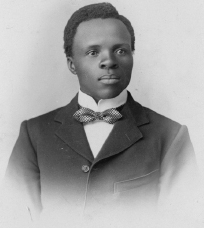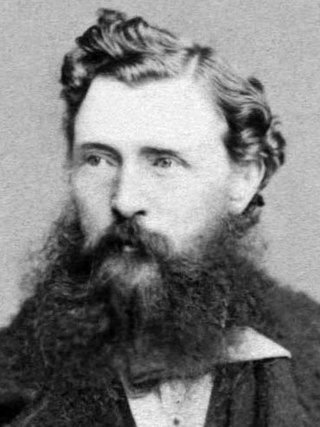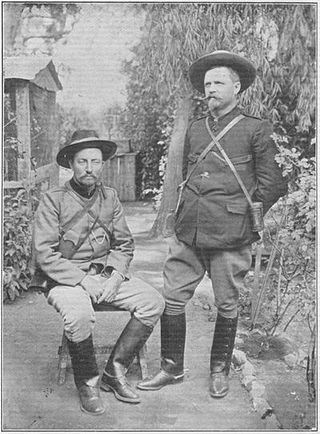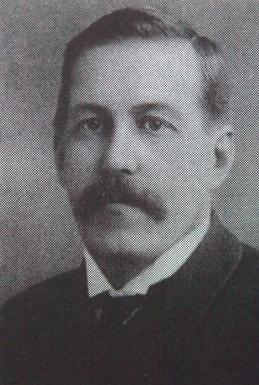
Solomon Tshekisho Plaatje was a South African intellectual, journalist, linguist, politician, translator and writer. Plaatje was a founding member and first General Secretary of the South African Native National Congress (SANNC), which became the African National Congress (ANC). The Sol Plaatje Local Municipality, which includes the city of Kimberley, is named after him, as is the Sol Plaatje University in that city, which opened its doors in 2014.

Cecil John Rhodes was an English mining magnate and politician in southern Africa who served as Prime Minister of the Cape Colony from 1890 to 1896. He and his British South Africa Company founded the southern African territory of Rhodesia, which the company named after him in 1895. He also devoted much effort to realising his vision of a Cape to Cairo Railway through British territory. Rhodes set up the Rhodes Scholarship, which is funded by his estate.

Sir Humphrey Vicary Gibbs,, was the penultimate Governor of the colony of Southern Rhodesia, from 24 October 1964 described by its internationally unrecognised government simply as Rhodesia, who served until, and opposed, the Unilateral Declaration of Independence (UDI) in 1965.

Johannesburg is a large city in Gauteng Province of South Africa. It was established as a small village controlled by a Health Committee in 1886 with the discovery of an outcrop of a gold reef on the farm Langlaagte. The population of the city grew rapidly, becoming a municipality in 1898. In 1928 it became a city making Johannesburg the largest city in South Africa. In 2002 it joined ten other municipalities to form the City of Johannesburg Metropolitan Municipality. Today, it is a centre for learning and entertainment for all of South Africa. It is also the capital city of Gauteng.

Lieutenant Frederic Brooks Dugdale VC was an English British Army officer and recipient of the Victoria Cross, the highest and most prestigious award for gallantry in the face of the enemy that can be awarded to British and Commonwealth forces.

Thomas François Burgers was a South African politician and minister who served as the 4th president of the South African Republic from 1872 to 1877. He was the youngest child of Barend and Elizabeth Burger of the farm Langefontein in the Camdeboo district of Graaff Reinet, Cape Colony.

The Johannesburg Zoo or Joburg Zoo is a 55-hectare (140-acre) zoo in Johannesburg, South Africa. The zoo is dedicated to the accommodation, enrichment, husbandry, and medical care of wild animals, and houses about 2000 individuals of 320 species. Established in 1904, it has traditionally been owned and operated by the Johannesburg City Council. However, it has been turned into a corporation and registered as a Section 21 non-profit organisation.

Museum Africa or MuseuMAfricA is a historical museum in Newtown, Johannesburg, South Africa.

Charles Davidson Bell FRSE was a Scottish-born artist who spent the majority of his life in the Cape Colony. In addition to serving as the Surveyor-General of the colony, he was also a heraldist who designed several of the Cape Colony's medals and stamps.

Sir George Herbert Farrar, 1st Baronet, was a South African mining magnate, politician and soldier – Colonel and assistant Quartermaster General – Central Force, Union Defence Force, Hon. Colonel South African Light Horse.

Benjamin Johannes "Ben" Viljoen was an Afrikaner-American consul, soldier, farmer, Maderista, and Boer general.
Gubbins is a surname. Notable people with the surname include:
Ottoshoop is one of the small towns in the Mahikeng Local Municipality in the North West Province of South Africa, situated 20km from the city of Mahikeng on the way to the town of Zeerust. Residents serve the scanty needs of a few locals, underwater divers and railway users. During the town's boom years from 1879 to 1880, Ottoshoop was, however, the commercial capital of South Africa. This spirit of the town still lives on in today's commercial capital of Africa – Johannesburg. Before the Europeans' arrival in mid-1800, the area was populated by the baRalong tribe, who built extensive walls to steer game into traps.
Kensington B is a suburb in Randburg, which is an area located in northern Johannesburg, Gauteng, South Africa.

Sir Marshall Campbell (1848–1917) was a pioneer of the sugar industry in the Colony of Natal and parliamentarian concerned with Bantu affairs.

William Frederick Purcell was an English-born South African arachnologist and zoologist. He is regarded as being the founder of modern araneology in South Africa.
Colonel Ignatius Philip Ferreira, was a South African soldier, fortune hunter, miner and farmer of Portuguese descent. He is more commonly known for having the earliest gold mining camp on the Witwatersrand named after him called Ferreirastown (Ferreirasdorp), which was on the edge of the farm Randjeeslagte soon to be proclaimed as the site of a new town called Johannesburg.
Henry George Flanagan was a Cape Colony-born plant collector, traveller, botanist and farmer. He developed a renowned garden for native South African trees and rare exotic plants. A rare endemic of Eastern Cape, Greyia flanaganii is one of several plants named in his honour.

Magema Magwaza Fuze was the author of Abantu Abamnyama Lapa Bavela Ngakona, the first book in the Zulu language published by a native speaker of the language.
Jan Eloff was the first civilian commissioner and the second mining commissioner in Johannesburg and the man to whom Eloff Street was named after, the first street to be surveyed. In time, twelve streets in the Greater Johannesburg area were named after him.














